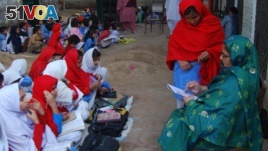17 September, 2019
While living conditions in many areas have improved in recent years, a child's place of birth is still the biggest predictor of its future.
Oh, yes – and no matter where you are born, life is more difficult if you are a girl.
These claims come from the Bill and Melinda Gates Foundation, a leading philanthropic organization for health and development.

Pakistani girls attend class at a makeshift school in a small graveyard in Gujranwala near Lahore, Pakistan on Friday, Nov 25, 2011. (AP Photo/Aftab Rizvi)
The group reports that some 500 million people worldwide lack basic health care or education. It also found that girls everywhere suffer from discrimination.
The new report is the foundation's third on United Nations Sustainable Development Goals. The report looks at efforts to reduce inequality and poverty and improve health around the world. It follows progress on 17 measures that most UN member countries have said they will try to reach by the year 2030.
Those efforts are falling short, says Bill Gates, the 63-year-old co-founder of Microsoft Corporation. He sat down with VOA at the foundation's offices in Seattle, Washington, before the report's release.
"As much progress as we're making, a child in many countries still over 10% are dying before the age of five. And in richer countries, it is less than 1%," said Gates. "So the idea that any place in the world is still 10%, some almost 15%...should galvanize us to do a better job."
The results "prove that the world's investments in development aren't reaching everyone," the report said. It noticed progress in the education of girls. But it also found that women's opportunities are limited by social customs, discriminatory laws, and violence.
"If you reduce the child death rate, families...choose to have less children. As you educate women, more families...choose to have less children," Gates said.
Smaller families can reduce poverty.
Gates Foundation chief executive Sue Desmond-Hellmann says the clearest warnings from the report were of the dangers of "gender and geography."
She said the report showed that more children die in Chad every day than in Finland every year. Also, Finland's average education is up to college level, while in Chad the average child does not finish primary school.
"It's just not okay that a child in Chad is 55 times more likely to die than a child in Finland," Desmond-Hellmann said. She added that a girl born in Africa has her gender and her geographic location affecting her future.
Generally, the report noted "unabated" development progress, with life, health and economic success improving on average across the world. But it also pointed out the large number of people who are being left behind.
I'm Susan Shand.
VOA's Linord Moudou and the Reuters News Agency reported this story. Susan Shand adapted it for VOA Learning English. George Grow was the editor.
Write to us in the Comments Section or on 51VOA.COM.
______________________________________________________________
Words in This Story
No matter – phrase. it is of no importance
philanthropic – adj. the practice of giving money and time to help make life better for other people
galvanize – v. to cause people to become so excited or concerned about an issue that they want to do something about it
opportunity – n. an amount of time or a situation in which something can be done
gender – n. the state of being male or female
geography – n. the study of the physical nature of the earth and its atmosphere
primary – adj. relating to the education of young children
unabated – adj. without reduction in strength or intensity